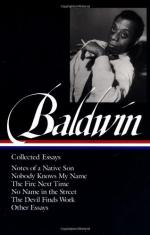
|
| Name: _________________________ | Period: ___________________ |
This test consists of 15 multiple choice questions and 5 short answer questions.
Multiple Choice Questions
1. According to Baldwin, who were the only people able to maintain a useful and unquestioned friendship with Negroes during the 1940s and 50s in Paris?
(a) White Americans.
(b) Negro entertainers.
(c) The French.
(d) Negro soliders.
2. What do the Swiss Villagers occasionally do on Sundays?
(a) Wash dirty laundry.
(b) Go to the movies.
(c) Cook dinner.
(d) Ski.
3. What tool(s) does Baldwin take with him to the Swiss village?
(a) Pens and Pencils.
(b) Typewriter.
(c) Books.
(d) Printing Press.
4. What does Baldwin say boys and young men of the Swiss village can be seen doing all week long?
(a) Skiing.
(b) Going to church.
(c) Praying.
(d) Shoveling snow off of the rooftops.
5. What prison was Baldwin's friend sent to that he was forbidden to enter?
(a) Fresnes.
(b) Sorbonne.
(c) La Mese.
(d) La Santé.
6. What does Baldwin say must sustain the American Negro in the present?
(a) The European present.
(b) The European future.
(c) The African past that is disregarded in Europe.
(d) The American past that is disregarded in Europe.
7. According to Baldwin, which one of the following performers had the ability to be a successful performer in Paris in the 1940s and 50s?
(a) Jospehine Baker.
(b) Harry Belafonte.
(c) Dorothy Dandridge.
(d) Duke Ellington.
8. Which group did Baldwin mention as living together in groups - in the same neighborhoods and student hotels - while in Paris in the 1940s and 50s?
(a) American Negroes.
(b) Black soldiers.
(c) The French African.
(d) White Americans.
9. According to Baldwin, which of the following can the black man call home?
(a) Africa.
(b) America.
(c) Nowhere.
(d) France.
10. According to Baldwin, how did an American Negro view another American Negro in Paris during the 1940s and 50s?
(a) A source of rage.
(b) A source of sadness.
(c) A source of knowledge.
(d) A source of joy.
11. What issue is the American constantly confronted with in Paris?
(a) Prejudice.
(b) Racism.
(c) Identity.
(d) Colonization.
12. What did Baldwin consume a lot of while writing?
(a) Croissants and Wine.
(b) Coffee and Croissants.
(c) Coffee and Wine.
(d) Coffee and Tea.
13. What gift did Baldwin's attorney friend bring him in prison?
(a) Coffee.
(b) A bottle of French wine.
(c) Clean bed sheets .
(d) Lucky Strike Cigarettes.
14. How does Baldwin describe the lives of the nonperforming Negroes in Paris as compared to the lives of Negro entertainers in the 1940s and 50s?
(a) Isolated.
(b) Exciting.
(c) Deprived.
(d) Boring.
15. According to Baldwin, where does the family lineage of any black man in America stop?
(a) Emancipation.
(b) Colonization.
(c) The slave trade.
(d) Africa.
Short Answer Questions
1. In what year did Baldwin's father die?
2. According to Baldwin, what discovery brings an end to the alienation of the American student in Paris?
3. What was the profession of Baldwin's father?
4. In the chapter, A Question of Identity, how does Baldwin learn about his struggle for identity in the world?
5. What is the name of the first church that Baldwin can remember attending with his family as a child?
|
This section contains 518 words (approx. 2 pages at 300 words per page) |

|




